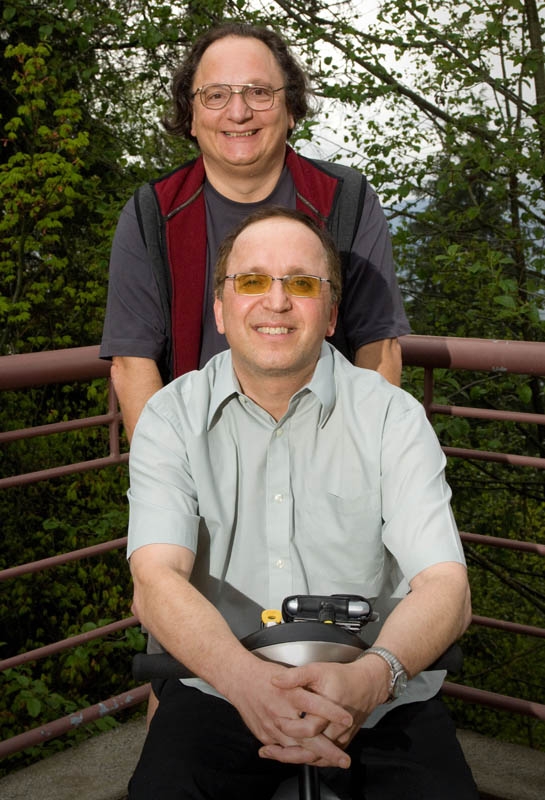
Peter Borwein (sitting), with his brother Jonathan Borwein (courtesy Canada Foundation for Innovation)
Peter was a prolific mathematician, with over 200 publications, including several books. His research included works in classical analysis, computational number theory, Diophantine number theory and symbolic computing. Many of these papers were co-authored with his brother Jonathan Borwein, and some were co-authored with his father David Borwein (and at least one was authored by all three of the Borwein family mathematicians). More generally, many of Peter’s papers were in the realm of experimental mathematics, wherein the computer is utilized an essential tool in the process of mathematical research.
Perhaps Peter’s best-known paper is “On the rapid computation of various polylogarithmic constants,” published in Mathematics of Computation in 1997. Among other things, this paper presented what is now known as the “BBP formula for pi,” together with a surprisingly simple algorithm for calculating binary digits of pi beginning at an arbitrary starting position, without needing to calculate any of the preceding digits. The central idea behind the paper was discovered by Peter, who demonstrated it for the relatively simple case of the natural logarithm of two; Simon Plouffe then used a computer program to discover the related formula for pi. Variations of the BBP formula have been used in conjunction with numerous recent record-breaking calculations of pi.
Peter and Jonathan established the Centre for Experimental and Constructive Mathematics (CECM) at Simon Fraser University (in Burnaby, British Columbia, Canada), in 1993. Later Peter helped found the Centre for Interdisciplinary Research in the Mathematical and Computational Sciences (IRMACS) at Simon Fraser, where he served as Director for many years. He also served on the editorial boards of several journals, including the Ramanujan Quarterly and the Electronic Transactions on Numerical Analysis.
Peter was a co-recipient (1993) of the Chauvenet Prize and the Merten Hasse Prize, both awarded by the Mathematical Association of America, and a co-recipient of the “Academic of the Year Award” (1996), awarded by the Confederation of University Faculty Associations of British Columbia.
Several colleagues have remarked how Peter was an inspiration for their work. Veselin Jungic, a prominent professor of mathematics at Simon Fraser, remarked in an email that Peter was “my friend, mentor, and a role model.”
The present author certainly is among those for whom Peter was an inspiration, as I have had the distinct privilege of collaborating with Peter Borwein on several occasions. This began in 1983, when I read an article in SIAM Review, co-authored by Peter and Jonathan, summarizing some of their recent discoveries of quadratically convergent algorithms for pi and elementary functions. After reading their article, I enthusiastically began programming some of their techniques, then called Peter and Jonathan to discuss my computational results. Thus began a productive and very enjoyable collaboration, beginning with the paper “Ramanujan, modular equations, and approximations to Pi,” published in the American Mathematical Monthly in 1989, and continuing with over 100 joint papers and books with myself and Peter and/or Jonathan.
Sadly, Jonathan Borwein passed away in 2016 (see also the Jonathan Borwein Memorial website). The death of Peter Borwein has now compounded an incalculable loss to the field of experimental mathematics.
Many will miss Peter, not just for his substantial mathematical achievements, but also for his humor, wit, and the astonishing grace with which he faced his condition of multiple sclerosis, which left him confined to a wheelchair, increasingly unable to pursue his research, and increasingly dependent on family and caregivers. I recall visiting Peter in January 2019 at his home in Burnaby, British Columbia. In spite of his paralysis and infirmity, I was astonished at his pleasant demeanor and ever-present humor. Would that we could all bear our misfortunes with as much strength and courage!
For additional details, see Peter Borwein’s obituary from the Vancouver Sun and Province.